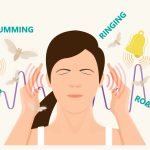The Tinnitus Management Program at Mass Eye and Ear aims to help people live with the debilitating effects of tinnitus.
Tinnitus is one of the most common hearing-related conditions in the United States affecting upwards of 50 million Americans.
A unique new program developed at Mass Eye and Ear is aimed at helping those whose tinnitus impacts their daily quality of life. The Tinnitus Management Program at Mass Eye and Ear was recently launched by the Department of Audiology to provide information and interventions to help people manage and cope with their tinnitus. While there remains no cure for tinnitus, such strategies can make a dramatic difference for a patient.
“One of the challenges with tinnitus is there is not what is considered a cure – medicines and surgery will not fix it and make tinnitus go away,” explained Meaghan Reed, AuD, CCC-A, director of clinical audiology at Mass Eye and Ear. “There can however be interventions to help people live with their tinnitus.”
Unwanted persistent sounds define tinnitus
Tinnitus manifests as sounds people hear in their head or ear and affects different people in different ways. Some experience ringing or buzzing in the ears, others might hear roaring or whooshing, people talking or music that isn’t there, or the sound of a heart beat or pulse. The sounds can be intermittent or continuous and present in one or both ears. Tinnitus can accompany other medical conditions and symptoms, such as: hearing loss, dizziness, ear and sinus infections, exposure to loud noises, Meniere’s disease, hormonal changes and thyroid problems.
Much remains to be learned about the causes of tinnitus and why it affects people so differently.
Mass Eye and Ear researchers have hypothesized that a loss of neuronal activity, from either auditory or non-auditory centers, can result in a readjustment within the brain. When the nerve cells in the brain stop receiving sensory input, they may overcompensate by amplifying incoming signals, which then causes the perception of sounds when are none present.
Researchers, including those at Mass Eye and Ear’s Lauer Tinnitus Research Center, are working to learn more about the condition in the hopes of offering patients better treatments or one day finding a cure. However until then, patients must learn to live with and manage their tinnitus.
Interventions from Tinnitus Management Program
Some individuals with tinnitus may decide not to seek any treatment. Others however are greatly impacted by the sounds. The Tinnitus Management Program at Mass Eye and Ear aims to provide interventions to help those whose tinnitus is greatly impacting their quality of life.
“Often individuals will come in with tinnitus worried it’s something worse, and once they learn that they only have ringing in my ear and it’s not something to be concerned about medically, they can move on with their lives,” explained Dr. Reed. “Other individuals are not able to do that, and tinnitus can be interfering and debilitating. People can’t sleep, can’t function and do their jobs. We really wanted to develop a program to offer support and coping strategies for these people.”
An individual interested in the program will first need to come in to Mass Eye and Ear to receive an evaluation from both an audiologist and doctor (ENT or otologist) to better understand their tinnitus, and whether it’s accompanied by any hearing loss or other treatable conditions. This component is crucial, according to Dr. Reed. Here a conversation will happen about how the tinnitus is affecting the patient’s quality of life.
If a patient wants further treatment, they will be referred to a tinnitus coordinator who can best direct their next steps for care. One potential treatment avenue for a patient with associated hearing loss is managing tinnitus with amplification. The first step to pursue this option is a Communication Needs Assessment with one of our audiologists who specialist in tinnitus to discuss device options.Using a hearing aid may control outside sound levels, which may improve hearing and make the tinnitus less noticeable and sometimes these devices have special programs that can be used to cope with tinnitus.
Individuals who do not have hearing loss or may not benefit from amplification will be referred to group management sessions through the Tinnitus Management Program. Mass Eye and Ear boasts one of the largest audiology departments in the country, and subset of them have received specialty certifications in tinnitus management. These audiologists serve as the program’s leaders, and provide two-part sessions for patients.
The first session is educational, where patients talk about tinnitus, debunk myths, and learn about sound therapy that might help manage tinnitus. Sound therapy is essentially using sound with stress reduction techniques, habituation and retraining of the brain to adapt and manage the tinnitus. For example, a person may play a sound of water rushing to help them fall asleep at night.
Individuals will take their learnings from the first session and work on managing their tinnitus for two weeks, before returning to the second session where they will discuss their experiences. They will also learn other ways to manage tinnitus, such as through mental health services like cognitive behavioral therapy.
Each session consists of about 10 patients with the audiologist, and are self-pay with a cost of $50 per session. Patients are encouraged to attend both sessions.
A New England resource for years to come
The Tinnitus Management Program at Mass Eye and Ear is the only program of its kind in New England. Prior to the introduction of this program, it was more commonplace for a patient to receive handouts and directed to resources to learn more about managing their tinnitus. This program offers a more hands-on approach to directly help patients.
Another unique part about the program is since it sits within the Mass General Brigham system, patients can take advantage of mental health and other services offered throughout New England. The program eventually would like to bring on full-time cognitive behavioral therapists to provide a one-stop experience for patients.
Additionally, the program has an added benefit of its proximity to researchers at the Lauer Tinnitus Research Center. Program participants can potentially one day become research participants, partnering with researchers working to better understand and test therapies for the condition as new studies come out.
Currently the program is only for patients in Mass Eye and Ear, but in the future may expand to offer management services to patients from other local hospitals or beyond.
“We hope to be a resource for patients with tinnitus for years to come,” said Dr. Reed.
Interested patients can contact the program directly at 617-807-7844 or be referred by their Mass Eye and Ear Doctor.
The National Institute on Deafness and Other Communication Disorders has more information on tinnitus.




I have had tinnitus for at least 15 years (left side) due to Meniere’s i have hearing loss in the left ear and i use a hearing aid.
For the past year i now have ringing in my right ear.
I would be interested in joining your program.
Hi Michael, interested patients can contact the program coordinator directly at 617-807-7844 or be referred by their Mass Eye and Ear Doctor.
I am interested in more info regarding this program and I may pursue membership after my next visit with my hearing doctor.
Hi John, interested patients can contact the program coordinator directly at 617-807-7844 or be referred by their Mass Eye and Ear Doctor.
I have been suffering with tinnitus and hearing loss for over 20yrs! Recently it has gotten much louder!! I am desperate for any help you can offer!
I came into mass eye and ear around 2010. I then had a 2nd opinion a few years later. Luckily any tumors were ruled out but my right ear still constantly rings and I always have an ear ache. I would be very interested in pursuing this.
Hi Dwyn, interested patients can contact the program coordinator directly at 617-807-7844 or be referred by their Mass Eye and Ear Doctor.
Awesome sharing of info related to causations and effects of tinnitus. I experienced bouts of relapsing polychrondritis which resulted in hearing
loss and degrees of tinnitus . MEEI has
has significantly assisted me. Do note
my interest in the envisioned program.
HCDooner
Hi HCDooner, interested patients can contact the program coordinator directly at 617-807-7844 or be referred by their Mass Eye and Ear Doctor.
I have been suffering and trying to live with this symphony of sounds for as long as I can remember. I’m so so interested in finally getting more information and hopefully getting to the bottom of this problem. Please please get back to me!!!!
Hi Kenneth, interested patients can contact the program coordinator directly at 617-807-7844 or be referred by their Mass Eye and Ear Doctor.
I can not be sure as to exactlytlymy symptoms started but I have been examined by physicians at Lahey Hospital and have been told there is no treatment for it. I have noticed the Symptoms are getting worse as I get older. Is it worthwhile to consider me as a candidate?
I am 78 and have suffered with tinnitus for at least 25 years and hearing loss for the last 15 years. Are there aides out there that help with hearing people actually like?
I’ve had tinnitus for over 15 yrs and was a patient of Dr. Levine until he left the US. I now live in Hawaii. My tinnitus (unilateral) was completely under control until 4 1/2 weeks ago when my GP tried to remove wax in that ear. I’ve had a terrible spike-which I fear may be permanent- and there is no one here that has expertise in this. I am wondering if I can arrange a telehealth appointment with one of your experts in this condition. I only get about 2-3 hrs sleep a night and I am exhausted. Masking no longer helps much. Thank you.
I have tinnitus, hearing loss and ear fullness. I noticed this after neck manipulation during a massage. I have an unaligned C1 and C2 by 1.75 degrees. Could this misalignment cause my symptoms?